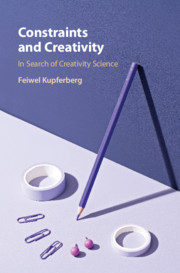Book contents
- Constraints and Creativity
- Constraints and Creativity
- Copyright page
- Contents
- Prolegomenon
- Preface
- Introduction
- Part I In Search of Creativity Science
- Part II Elaborating the Theoretical Model
- Part III Conclusions: First Principles of Creativity Science
- Chapter 7 Concepts and Knowledge Object
- Chapter 8 Data, Methods and Constraints
- References
- Index
Chapter 8 - Data, Methods and Constraints
from Part III - Conclusions: First Principles of Creativity Science
Published online by Cambridge University Press: 09 July 2021
- Constraints and Creativity
- Constraints and Creativity
- Copyright page
- Contents
- Prolegomenon
- Preface
- Introduction
- Part I In Search of Creativity Science
- Part II Elaborating the Theoretical Model
- Part III Conclusions: First Principles of Creativity Science
- Chapter 7 Concepts and Knowledge Object
- Chapter 8 Data, Methods and Constraints
- References
- Index
Summary
This chapter elaborates upon Aristotle’s methodological theory of First principles and tries to bring it up to date by relating it to different debates about data and methods of relevance for creativity science. The theory of “Whig history” as used by Kuhn forbids retroactive analysis. Kuhn ignores the fact that successful scientific revolutions solve tricky problems and generalizes from an unsuccessful revolution (fallacy of induction). Pioneers are effective causes (no death of the author, compare Barthes). Autobiographies are not always reliable and are merely a part of observing pioneering work or intellectual biographies. Creative processes are complex (compare Diamond’s “Anna Karenina” principle). This is the reason that biographical data on pioneers can best be seen as natural experiments. The data base should be broad (interdisciplinary) and contrasted both across and within intellectual fields or creativity regimes. A theory of methodology is missing in both rationalist and empiricist accounts of scientific creativity.
Keywords
- Type
- Chapter
- Information
- Constraints and CreativityIn Search of Creativity Science, pp. 288 - 311Publisher: Cambridge University PressPrint publication year: 2021

